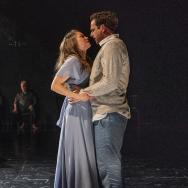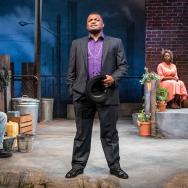After a more than a year of pandemic-related delays, cancellations and adjustments, the University of Chicago’s Court Theatre returned to its stage this fall with a classic: Shakespeare’s The Tragedy of Othello, the Moor of Venice.
The play is the first that Court has staged in front of an in-person audience since the start of the pandemic in early 2020. In reopening the theater’s doors, co-directors Charles Newell and Gabrielle Randle-Bent wanted a show that addressed issues of race, gender and history, while also giving the audience a unique, immersive experience.
The result is a production that rethinks Othello’s meaning—as a love story, as well as a story about the destructive power of jealousy.
“In a way, Othello has been a gift because it is so hard and so thorny and is full of so many of the things we’re so afraid of right now,” said Randle-Bent, a Court Theatre research fellow, speaking about why she felt staging the play was important despite its complexities. “To run away from it isn’t reckoning with it.”
In the play, Othello, a Black North African military commander, marries a Venetian noblewoman, Desdemona. Subsequently, he is manipulated into jealousy by his flag-bearer, Iago, who tricks him into believing that Desdemona has been unfaithful, with tragic consequences.
Often, performances of the play focus on Iago’s agency and characterization as a master manipulator. He’s the one who utters one of the play’s most famous ironic lines: “O beware, my lord, of jealousy! // It is the green-eyed monster which doth mock // The meat it feeds on.”
By centering Othello, the directors sought to make the play more expansive.
“To center Black identity, Black interiority, Black tragedy is actually to make more room for humanity,” said Randle-Bent. She and Newell, Court’s artistic director, interpreted the play by taking a critical look at the motivations and relationships of every character—including Iago and those in supporting roles.
Kelvin Roston Jr., who plays Othello, was also invited to discussions about set design and other aspects of the production. A veteran stage actor who has appeared in many other Court Theatre shows, Roston brought his perspective as a Black actor playing Othello to every part of the play, including the ways in which the depth of Othello’s existing relationships with other characters compound the tragedy.
“If he loves [Desdemona] so intensely and so deeply, what kind of relationship must he have had with Iago to change his mind like that?” Roston said at a Court event titled “Othellos in Dialogue,” in which a panel of Black actors discussed their process for interpreting the work.
The “silver lining” of the delays caused by the pandemic, Roston added, was the extra time it afforded to “try to get a better understanding of what is necessary for Othello to be a human.”
The additional development time had a profound impact on the work, Newell agreed.
“To have a production that has two to three times our normal time for iteration has been a joy,” he said, adding that bringing Roston into design discussions was critical: “Typically, the design team makes the decisions and the actors show up at the first rehearsal. Here, the actor playing Othello was present to tell us who he wanted to be and to create. Kelvin’s influence was significant to the project’s evolution.”
The production team also decided to seat audience members on stage in swivel chairs—close to, but not quite theater in the round—such that the action of the play happens all around them.
The set also features walkways and scaffolding that pass above and through the audience, making for a particularly intimate experience after a year in which most people only watched live entertainment via streaming, if at all.
Though the play is set in Venice and on the island of Cyprus (which was then controlled by the Venetian Republic), the scaffolding and simple but elegant costumes help situate the drama as a more universal story—not one specific to a particular time and place.
The centuries-old work also feels fresh thanks to a series of other careful decisions, including trimming down Shakespeare’s original text; additional attention on the characterization of Othello; and a choice not to directly portray the story’s intense physical violence so that the psychological violence remains front and center.
Performances began Oct. 8 and will continue through Dec. 5 in-person at Court Theatre and streaming on demand. In addition to Roston Jr. as Othello, the cast includes Sheldon Brown as Cassio; Amanda Drinkall as Desdemona; Sean Fortunato as Brabantio; Cruz Gonzalez-Cadel as Iago’s wife, Emilia; Erik Hellman as Roderigo; Timothy Edward Kane as Iago; Karissa Murrell Myers as the Duke of Venice; and Darren Patin as Bianca.

